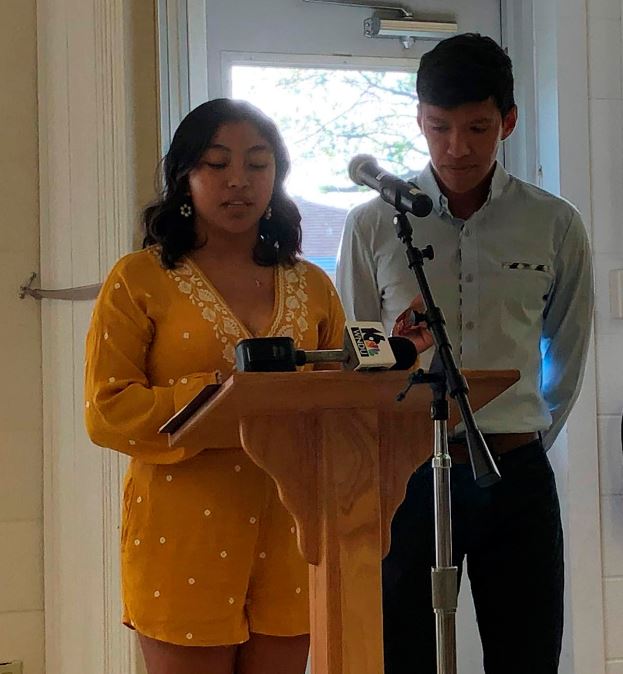by Denise Fedorow, originally published by The Goshen News

Goshen College students who formed an Indigenous Advocacy group called One Circle want a meeting with Attorney General Todd Rokita, and they don’t want to settle for a staffer.
They want to ask Rokita why Indiana has joined a case to dismantle the Indian Child Welfare Act.
The students who founded and are co-presidents of One Circle, Arleth Martinez and Manny Villanueva, spoke to a group of approximately two dozen people Thursday night at Waterford Mennonite Church.
One Circle was founded at the beginning of the semester, according to Villanueva, after visiting tribal lands in Arizona and it’s a group of Goshen College students invested on spreading awareness and developing action plans around Indigenous communities.
The Indian Child Welfare Act is a federal law passed in 1978 to help keep Native American children within Native communities. It was passed in response to the high number of Native American children being removed from their homes by both public and private agencies.
The students were introduced by Luke Gascho, a member of Waterford Mennonite Church and a member of the Coalition to Dismantle the Doctrine of Discovery — a principle of international law from the late 15th century that sanctioned the conquest, colonization and exploitation of non-Christian territories and people.
Gascho welcomed everyone and said the land where the church sat was Potawatomi’s land and nearby Waterford Mills was once a Potawatomi village so he thought it was a fitting space for the evening’s topic. He shared that the Coalition to Dismantle the Doctrine of Discovery started in 2014 and has two major components — cultural change and structural change and said, “Tonight we’ll be talking about structural change with ICWA.”
Manny Villanueva spoke first stating that he was a third year Business major at Goshen College and said after the SST trip to Arizona he began studying ICWA and found one out of four Native American children are in foster homes — but not with family members or their community.
Villanueva said he wants to educate people and change the narrative and that “looks like this — talking about issues and topics with others and engaging in action plans.”
He said this has forced him to look inside himself.
“These conversations do matter, especially supporting Native children,” he said. “I’d like to talk to the attorney general and ask why Indiana residents are being represented in this way and we hope to secure that meeting in a couple of months.”
Arleth then addressed the group sharing that she is a second year Sociology major and shared after meeting with a senior Apache leader in Arizona and camping in Oak Flat.
“I found a spark and felt a connection and I knew something in me called me to do this work,” she said.
She gave a presentation to the Coalition to Dismantle the Doctrine of Discovery and came up with the idea for One Circle — creating a space on campus to talk about these issues with others so they can be inspired to be advocates and peacemakers.
Martinez shared why she felt so connected to the plight of Indigenous children. She was born in Mexico City and grew up in California and moved to Goshen a few years ago. She shared she was an undocumented child and felt constant fear of being taken away or deported. They were told, if an unfamiliar car came around, to hide.
For a long time she hid her status and lived in fear.
“I felt shame towards my culture — I faced racial discrimination throughout school,” she said. “When we can connect to our culture it helps have pride in ourselves and a sense of belonging and that’s what ICWA stands for.
“ICWA is not a case of race — it’s wanting to keep children with their culture. Children should have peace of mind and enjoy their childhood instead of living in constant fear of being displaced and taken away. This is not the way children should spend childhood.”
She quoted an Indigenous woman, Madonna Thunderhawk, who said, “If we can’t save our children then why are we saving our land?”
Martinez said ICWA needs to be upheld.
“In the Christian faith we belong to one another we’re all brothers and sisters,” Martinez said. “This state signed on to this (lawsuit Haaland v Brackeen) that ICWA is unconstitutional. We want to hear from Todd Rokita why is this the case? As Indiana constituents we want to know why we’re challenging a law designed to protect children of color.”
Martinez said they wrote a letter to Rokita and received a response to fill out a form to get a speaker and they don’t want a speaker, they want Rokita so they re-submitted the request. The students asked those present to also write a letter to the attorney general requesting he meet with the students.
“My tax dollars pay for Todd Rokita — are Native children in Indiana being affected by this?” one woman in the audience asked.
Martinez replied that Indiana signed on to the law under the Curtis Hill administration along with Texas and Louisiana and said all three states cohesively represent 1% of Indigenous people, “so why is Indiana in the suit if they don’t have a lot of Indigenous in the state?”
Goshen City Council member Gilberto Perez Jr. commented that the City of Goshen has an Indigenous People Day and taxpayers help pay for that event, so maybe they should have a conversation with elected officials about having the city bring something to Attorney General Todd Rokita asking, ‘Why are we doing this?’ He asked how they could connect the dots with what they’re advocating for and the wider community. He said he was supportive of upholding ICWA.
After the event, Perez was asked if he could bring the matter to the council and he said he could, but his point was to get the students to have that conversation with elected officials.
“We’re here to help the community and make connections — we’re supposed to represent,” he said.
Jane Ross Richer, chair of ICWA answered a question about whether ICWA was being violated.
“There are Christians saying, ‘No more. We’re not going to back up the tearing down of ICWA — the best place for kids are in the home or at least with their communities,’” she said. “We are Christians who believe children deserve to be with people of their own identity.”
For more information, contact JaneRossricher@gmail.com.

